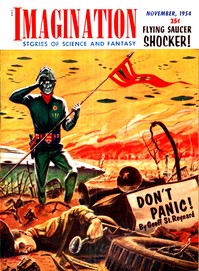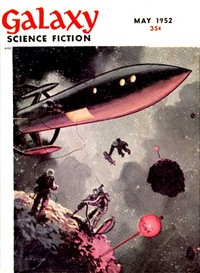Tony suddenly went rigid and stared at the empty space where his desk
had stood. He put his hand to his forehead, wondering if his financial
troubles were affecting his reason. By that time, another desk stood
in the place.
And what a desk! The one that now stood there was smaller than his own
palatial one, and shabbier. A raw, unpleasant golden-oak, much
scratched and scuffed. Its top was heaped and piled full of books and
papers. In the middle of it stood a photograph of a girl, framed in
red leather. Irresistibly, the sunny beauty of the face, the bright
eyes, the firm little chin, the tall forehead topped by a shining mass
of light curly hair, drew Tony's first glance. For a few moments his
eyes rested delightedly on the picture.
Perhaps it isn't fair to give the impression that the desk was in
disorder. It was merely busy; just as though someone who had been
deeply engaged in working had for the moment stepped away. There was a
row of books across the back edge, and Tony leaned over eagerly to
glance at the titles.
"'Theory of Parallels,' Lobatchevsky; 'Transformation of Complex
Functions,' Riemann; 'Tensors and Geodesics,' Gauss," Tony read.
"Hm—old stuff. But here's modern dope along the same line. 'Tensors,'
by Christoffel; 'Absolute Differential Calculus,' by Ricci and Levi
Civita. And Schrödinger and Eddington and D'Abro. Looks like
somebody's interested in Relativity. Hm!"
A title, "The Parallel Transformations of Equations for Matter,
Energy, and Tensors," had been crossed out with purple ink, and "The
Intimate Relation between Matter and Tensors" substituted. Tony bent
over it and read. He was so fascinated that it did not even occur to
him to speculate on the happy circumstance that the mysteriously
appearing desk had brought its own scientific explanation with it. The
title of the paper told him that its sheets would elucidate the
apparently supernatural phenomenon, and all he did was to plunge
breathlessly ahead in his eager reading. The article was short, about
seven typewritten sheets. He took out his pencil and followed through
the mathematical equations readily. Tony's mind was a brilliant, even
though an erring one.
"My father is Professor Bloomsbury at the University of Chicago. He
has been experimenting in mathematical physics, and I have been
assisting him. He has succeeded in proving experimentally the concept
of tensors. A tensor is a mathematical expression for the fact that
space is smooth and flat, in three dimensions, only at an infinite
distance from matter; in the neighborhood of a particle of matter,
there is a pucker or a wrinkle in space. My father has found that by
suddenly removing a portion of matter from out of space, the pucker
flattens out. If the matter is heavy enough and its removal sudden
enough, there is a violent disturbance of space. By planning all the
steps carefully my father has succeeded in swinging a section of
space on a pivot through an angle of 180 degrees, and causing two
portions of space to change places through hyperspace, or as you might
express it popularly, through the fourth dimension."

























